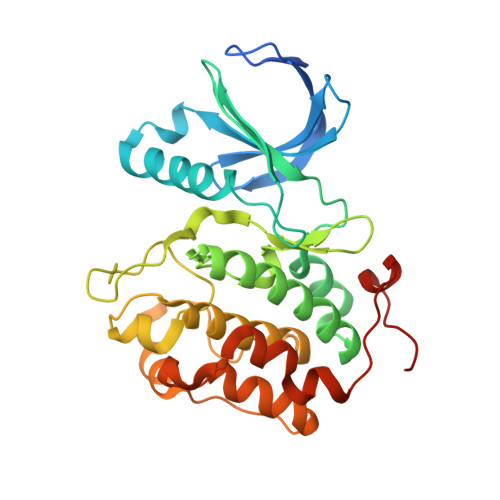Selective and brain-permeable polo-like kinase-2 (Plk-2) inhibitors that reduce alpha-synuclein phosphorylation in rat brain.
Aubele, D.L., Hom, R.K., Adler, M., Galemmo, R.A., Bowers, S., Truong, A.P., Pan, H., Beroza, P., Neitz, R.J., Yao, N., Lin, M., Tonn, G., Zhang, H., Bova, M.P., Ren, Z., Tam, D., Ruslim, L., Baker, J., Diep, L., Fitzgerald, K., Hoffman, J., Motter, R., Fauss, D., Tanaka, P., Dappen, M., Jagodzinski, J., Chan, W., Konradi, A.W., Latimer, L., Zhu, Y.L., Sham, H.L., Anderson, J.P., Bergeron, M., Artis, D.R.(2013) ChemMedChem 8: 1295-1313
- PubMed: 23794260
- DOI: https://doi.org/10.1002/cmdc.201300166
- Primary Citation of Related Structures:
4I5M, 4I5P, 4I6B, 4I6F, 4I6H - PubMed Abstract:
Polo-like kinase-2 (Plk-2) has been implicated as the dominant kinase involved in the phosphorylation of α-synuclein in Lewy bodies, which are one of the hallmarks of Parkinson's disease neuropathology. Potent, selective, brain-penetrant inhibitors of Plk-2 were obtained from a structure-guided drug discovery approach driven by the first reported Plk-2-inhibitor complexes. The best of these compounds showed excellent isoform and kinome-wide selectivity, with physicochemical properties sufficient to interrogate the role of Plk-2 inhibition in vivo. One such compound significantly decreased phosphorylation of α-synuclein in rat brain upon oral administration and represents a useful probe for future studies of this therapeutic avenue toward the potential treatment of Parkinson's disease.
- Molecular Discovery, Elan Pharmaceuticals, 180 Oyster Point Boulevard, South San Francisco, CA 94080, USA.
Organizational Affiliation:

















